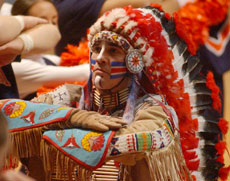NCAA rejects University’s appeal for Chief Illiniwek symbol

The Chief walks off the court during halftime of the Illinois/Quincy men´s basketball game on Wednesday at Assembly Hall. Editor Editor
November 11, 2005
CHAMPAIGN, Ill. (AP) – The University of Illinois’ use of the “Fighting Illini” nickname is acceptable, but its tradition of a buckskin-clad student dancing at home sporting events is not, the NCAA declared Friday as it upheld the school’s exclusion from hosting postseason tournaments.
The NCAA staff review committee also castigated the school for an Indian head logo that appears on officially licensed T-shirts and other merchandise. The logo does not appear on any team uniforms but remains approved for use, an athletic department spokesman said.
“The issue of the logo mark … that depicts a Native American in feathered headdress adds to the use of Native American imagery that the broadest range of indigenous tribes and peoples find offensive and insulting,” said Bernard Franklin, the NCAA’s senior vice president for governance and membership.
“Despite good intentions and best efforts, the stereotyping of Native Americans into narrow images is an undeniable consequence of choosing such names and symbols,” Franklin said in a prepared statement.
Illinois spokesman Tom Hardy said the University would look at the NCAA’s action more closely before determining how it would proceed. The University can appeal to the NCAA executive committee.
Get The Daily Illini in your inbox!
“I think we’ll have to see where the board of trustees wants to go,” Hardy said. The trustees’ next scheduled meeting is in January.
The tradition on the Urbana-Champaign campus of having a student dress as “Chief Illiniwek” began in 1926. Clad in buckskins and headdress, Illiniwek dances at halftimes of home football, basketball and volleyball games on the school’s flagship 39,000-student campus.
Illiniwek has divided the campus for years, with supporters arguing that his appearance honors the state’s American Indian heritage and opponents countering that the mascot is nothing more than a racist stereotype.
Hardy said Friday’s decision does not immediately impact Illiniwek, who was scheduled to perform Friday night at a volleyball game against Ohio State.
In June 2004, the school’s Board of Trustees refused to embrace or reject the mascot and instead called on supporters and opponents to bring the issue to a “consensus conclusion.” The Board has never subsequently defined what would be a “consensus conclusion” but maintains that the process of reaching it is ongoing.
The NCAA’s decision on American Indian mascots, issued Aug. 5, bars universities on its list of schools deemed to use hostile imagery from hosting postseason tournaments after Feb. 1, 2006. The decision also requires those schools to remove any offensive nickname or logo from team, cheerleader and band uniforms when participating in championship events.
In its appeal, Illinois said the “Fighting Illini” and “Illini” nicknames were derived from the name of the state, not from the name of a tribe.
“We’re gratified that the NCAA agreed with the University’s points about Illini and Fighting Illini having nothing to do with Native American imagery as used by the University,” Hardy said. “I’m sure that will be comforting to the students and hundreds of thousands of alumni who are proud to call themselves Illini.”
The appeal review committee asked Illinois to educate students, alumni and the public about the origin of the Illini nickname and how it is not associated with American Indians.
—
Related Links:






